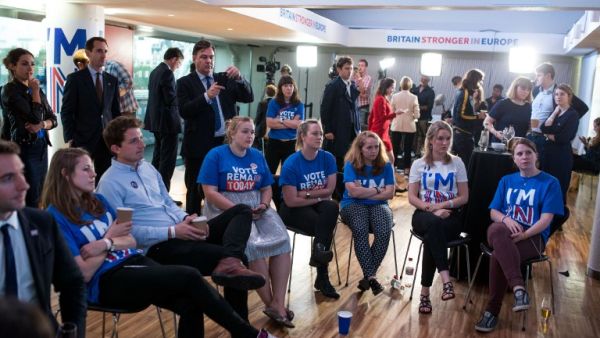Britain has voted to leave the European Union, British broadcasters BBC, ITV and Sky News forecast Friday, in the wake of a referendum that seems prepared to pile more woes onto an already troubled EU.
The BBC forecast that 52 per cent of voters opted for a Brexit, while 48 per cent want to stay in the world's biggest economic bloc, after 339 of 382 local results had been counted.
The vote has raised fears that a so-called Brexit could spur calls for similar referendums across the EU.
It would be the first time that a country decided to leave the EU, at a time when the union is also dealing with internal tensions about its migration crisis, as well as with high unemployment and growing anti-EU sentiments among the European public.
The mostly Conservative Vote Leave platform and the right-wing UKIP had lobbied for a Brexit, arguing that this was the only way to protect Britain's sovereignty and control EU migration.
"Let June 23 go down in our history as our independence day," UKIP leader Nigel Farage said.
The biggest effect from the British referendum was that other countries were starting to doubt the EU, he also said.
The Remain camp has argued that an exit from the EU's common market would hurt the British economy and cost jobs, a view that is shared by other EU countries, as well as by leading economists around the world.
In addition, economists have warned that financial markets could be thrown into turmoil if Britons vote the EU's second-largest economy, after Germany, out of the bloc.
Early on Friday, the pound fell below the 1.35-dollar level for the first time since 1985.
Most cities in north-eastern England returned large majorities for Leave following Thursday's vote, while Scotland and Northern Ireland overwhelmingly voted for Remain.
Several areas of London also voted strongly for Remain, with 79 per cent opting to stay in the EU in the city's south-eastern borough of Lambeth, as national turnout averaged 72 per cent.
In contrast, the vote for Leave was 76 per cent in Boston in eastern England, a market town with the country's highest proportion of eastern European migrants, according to a national census in 2011.
About 46.5 million people were registered to vote.
A YouGov survey of nearly 5,000 people who voted showed that, among voters with a standard school education, 66 per cent voted for a Brexit, while 71 per cent of those with university degrees voted in favour of remaining in the EU.
Prime Minister David Cameron, under pressure from those in his own Conservative party and a rising euroscepticism among British voters, had promised in 2013 to hold a referendum on EU membership.
He called the vote in February after negotiating a package of reforms with the bloc that he said would give Britain a "special status" if voters opt to remain in the EU.
The BBC forecast that 52 per cent of voters opted for a Brexit, while 48 per cent want to stay in the world's biggest economic bloc, after 339 of 382 local results had been counted.
The vote has raised fears that a so-called Brexit could spur calls for similar referendums across the EU.
It would be the first time that a country decided to leave the EU, at a time when the union is also dealing with internal tensions about its migration crisis, as well as with high unemployment and growing anti-EU sentiments among the European public.
The mostly Conservative Vote Leave platform and the right-wing UKIP had lobbied for a Brexit, arguing that this was the only way to protect Britain's sovereignty and control EU migration.
"Let June 23 go down in our history as our independence day," UKIP leader Nigel Farage said.
The biggest effect from the British referendum was that other countries were starting to doubt the EU, he also said.
The Remain camp has argued that an exit from the EU's common market would hurt the British economy and cost jobs, a view that is shared by other EU countries, as well as by leading economists around the world.
In addition, economists have warned that financial markets could be thrown into turmoil if Britons vote the EU's second-largest economy, after Germany, out of the bloc.
Early on Friday, the pound fell below the 1.35-dollar level for the first time since 1985.
Most cities in north-eastern England returned large majorities for Leave following Thursday's vote, while Scotland and Northern Ireland overwhelmingly voted for Remain.
Several areas of London also voted strongly for Remain, with 79 per cent opting to stay in the EU in the city's south-eastern borough of Lambeth, as national turnout averaged 72 per cent.
In contrast, the vote for Leave was 76 per cent in Boston in eastern England, a market town with the country's highest proportion of eastern European migrants, according to a national census in 2011.
About 46.5 million people were registered to vote.
A YouGov survey of nearly 5,000 people who voted showed that, among voters with a standard school education, 66 per cent voted for a Brexit, while 71 per cent of those with university degrees voted in favour of remaining in the EU.
Prime Minister David Cameron, under pressure from those in his own Conservative party and a rising euroscepticism among British voters, had promised in 2013 to hold a referendum on EU membership.
He called the vote in February after negotiating a package of reforms with the bloc that he said would give Britain a "special status" if voters opt to remain in the EU.
By Albert Otti and Bill Smith








